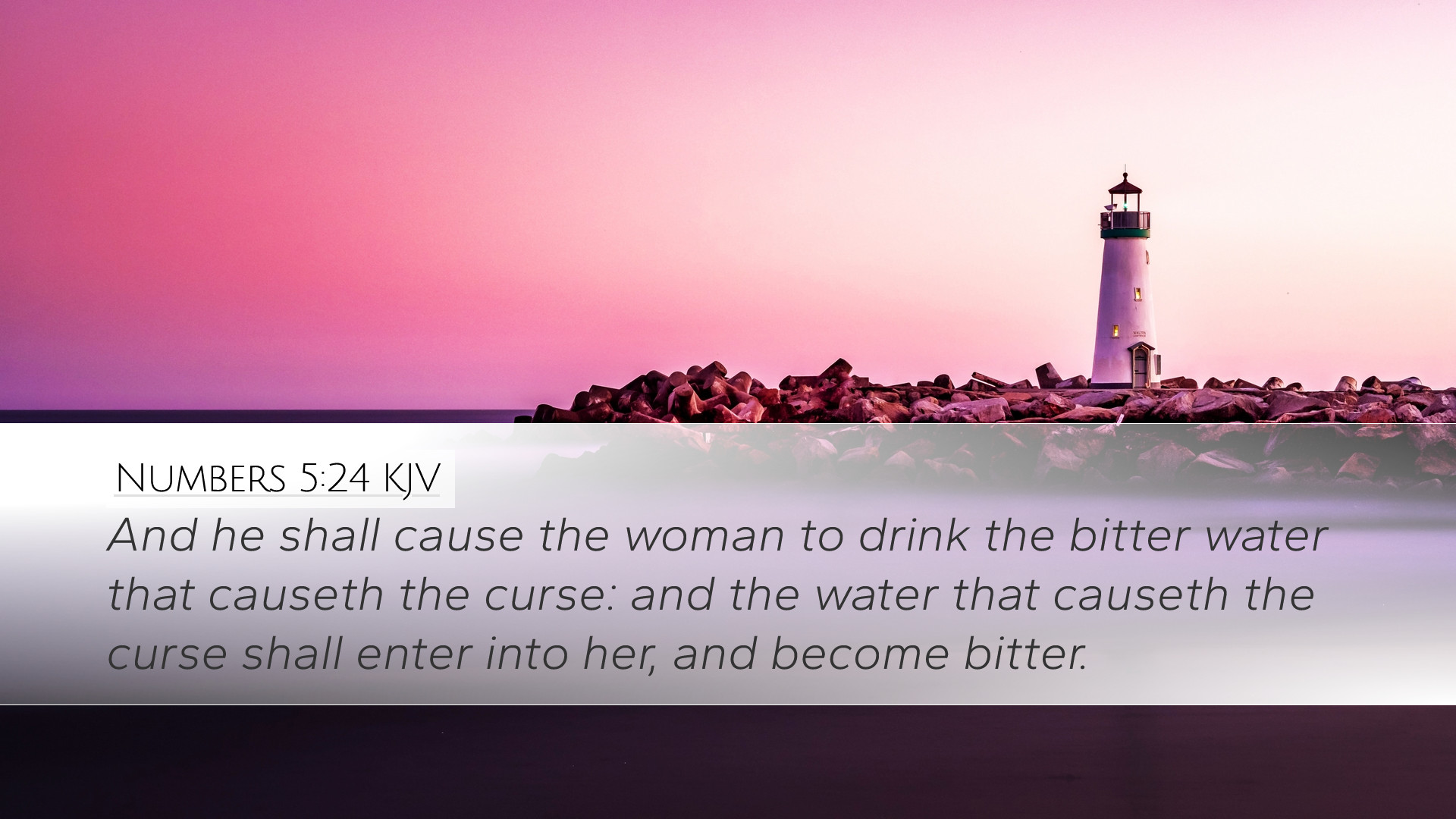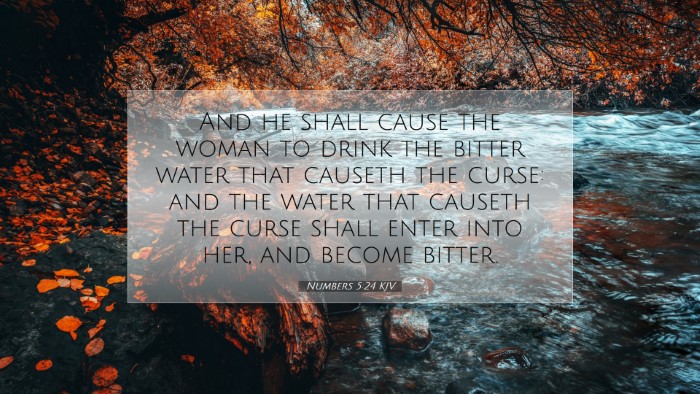Commentary on Numbers 5:24
Verse Citation: Numbers 5:24 - "And he shall cause the woman to drink the bitter water that causeth the curse; and the water that causeth the curse shall enter into her, and become bitter."
Introduction
The passage of Numbers 5:24 is situated within a larger context that deals with the laws of jealousy and the circumstances surrounding a suspected adulterous situation. This scripture delves into a unique ritual intended to ascertain women's fidelity through a divinely ordained test. The complexity of this commandment offers profound insights into the nature of sin, judgment, and the delicate nature of communal integrity.
The Setting of the Parameters
According to Matthew Henry, the ordinance covered in Numbers 5 outlines a procedural requirement for a husband who suspects his wife's unfaithfulness. This act, characterized as a "trial by ordeal", underscores the seriousness of false accusations, the delicacy of marital fidelity, and societal purity.
Albert Barnes expands upon this, indicating that the test is both physical and spiritual in nature. It illustrates not just the fidelity of the woman but reflects the husband's commitment to addressing suspicions in a divinely sanctioned manner. The water symbolizes God's judgment, leading one to reflect on the broader implications of divine justice in the covenant community.
The Bitter Water: Symbolism and Consequences
The "bitter water" mentioned in the verse carries significant symbolism. Adam Clarke articulates that the bitterness represents the consequences of sin laid bare. The ritualistic drinking of the water not only tests the woman’s faithfulness but also exposes the severity of the consequences of adultery—betrayal of trust and covenant.
Furthermore, this ritual presides over important theological implications. It indicates a clear delineation of guilt and innocence, and reflects God's role in personal and communal holiness. Henry comments on how this act serves both as a warning against infidelity and an appeal to divine justice, signaling that God is the ultimate judge in matters of righteousness and morality.
The Role of the Priest
The involvement of the priest in this process is essential, as noted by Barnes. The priest acts as an intermediary figure, emphasizing God's active role within the framework of the covenant community. This mediator not only facilitates the test but also invokes God’s name during the proceedings, showcasing the scriptural reliability concerning justice and faithfulness.
Additionally, Clarke emphasizes the necessity of pastoral guidance in sensitive matters, suggesting that leaders in faith must exhibit both discernment and compassion. The act of accusing and testing a spouse must never be taken lightly, showing the priest’s role as a protector of both the accused and the accuser within the faithful community.
Mercy and Grace Amidst Judgment
Although the passage speaks directly about judgment, it importantly implies the potential for grace and restoration. Henry points out that the ritual reveals God's care for truth and integrity within the marriage institution, aiming to preserve the sanctity of relationships. If the woman were innocent, this ordeal would serve not only to clear her name but also to re-establish her standing within the community, emphasizing God’s justice mingled with mercy.
This aspect can provide much food for thought for pastors and theologians alike—divine judgment is never isolated from mercy. God’s justice aims to foster truthfulness, yet offers the possibility of redemption within the community, reflecting a balance often needed in pastoral care.
Applications for Today
- Understanding Sin: The ritual illustrates the seriousness of sin, particularly in relationships. Today’s believers should recognize the gravity of betrayal and the need for accountability within relationships.
- Seeking Forgiveness: The process underscores a believer's need to seek reconciliation and forgiveness, both from God and from one another, when trust is broken.
- The Role of Leadership: Pastoral leadership is crucial in mediating conflicts and misunderstandings. Like the priest in this scenario, leaders should guide their congregants with wisdom, ensuring that actions align with scriptural principles.
- Divine Justice: This passage reminds believers of God’s omnipresence in matters of morality. Justice is upheld, but it should also provoke us to approach one another with grace and patience.
Conclusion
Numbers 5:24 provides a profound discourse on the intersection of justice, fidelity, and community. The insights drawn from Matthew Henry, Albert Barnes, and Adam Clarke highlight the layered complexities inherent in this passage and emphasize its relevance for contemporary believers.
For pastors, students, theologians, and scholars, this passage serves not merely as a historical account but as a living instruction for navigating difficult relational dynamics while remaining true to scriptural integrity.


